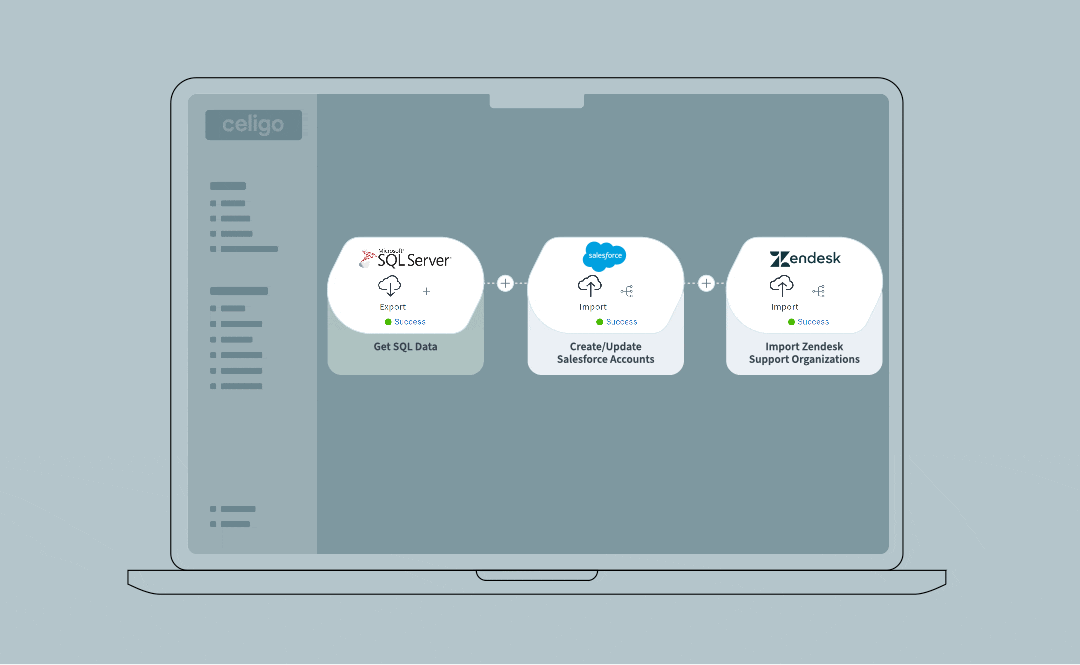Published Jan 19, 2021
How can an iPaaS solve fragmentation?
Discover how iPaaS connects SaaS applications across the enterprise to eliminate fragmentation
Your company likely uses dozens, maybe hundreds, of different business applications. SaaS usage is accelerating, with 25% of IT leaders saying their companies are SaaS only. This percentage will likely increase to a vast majority within five to 10 years. However, without an integration strategy, a large tech stack can become unwieldy and lead to fragmentation, the breakdown of business processes across different teams.
Let’s dive into the obstacle of fragmentation and the best approach for preventing it.
Key takeaways: Solving fragmentation
- As SaaS adoption grows, companies risk fragmentation, where different teams use separate applications.
- Without integration, critical business data remains siloed across different apps, making it difficult to make informed decisions and maintain agility in a competitive market.
- An Integration Platform as a Service (iPaaS) connects SaaS applications across the enterprise, improving agility, data integrity, efficiency, and visibility.
- Unlike traditional integration solutions that rely solely on IT, Celigo’s next-generation iPaaS enables both IT teams and business users to build, manage, and monitor integrations.
The cost of fragmentation
“SaaS sprawl” is the inevitable challenge of managing multiple SaaS applications across the company. Fragmentation is the potential pitfall of SaaS sprawl. If you have separate teams using separate apps, each team has their own system of record.
For example, take a closer look at a typical quote-to-cash business process. This process can involve different roles across sales and finance that use CRM, ERP, billing, and CPQ software.
The key data needed to make quick, informed decisions are inaccessible because they are siloed in these disparate apps. This issue can cost scaling companies their ability to stay agile in a competitive business landscape.
The benefits of iPaaS
It all starts with integrating SaaS apps across the whole enterprise to prevent fragmentation and properly automate your processes. While organizations can utilize a combination of integration approaches, an integration platform (iPaaS) is ultimately the best overall option for your maturing company.
The right iPaaS enables your organization to quickly integrate your applications with pre-built integrations and flows while also offering advanced developer features for customization based on your business requirements.
Here are four key strengths of an iPaaS:
Agility
Your team becomes more flexible to act on available intelligence when they use this customizable platform instead of approaches designed for narrow use cases.
Data integrity
Moving away from manual processes will reduce the likelihood of redundancy and errors while ensuring your data safely reaches its destination.
Efficiency
This platform is designed to handle a high volume of requests, supporting your maturing company’s productivity.
Visibility
From a more centralized vantage point, you can monitor your integrations, manage any errors, recover from them, and resolve issues.
Integration solution for growing companies
An iPaaS is a powerful tool for addressing fragmentation, but not all iPaaS solutions are the same. As an example, some focus on centralizing all integrations with IT, while at Celigo, we believe today’s world requires a more balanced approach. That’s why our next-generation iPaaS, gives IT the tools for customization and handling overarching complexities while empowering business users to solve their unique use cases.
Based on our experience and by working closely with our customers, we’ve developed prebuilt integrations and over 200 connectors with leading SaaS apps to help companies get started. Plus, we’ve created guides and roadmaps for business process automation to support our customer’s needs.
Some of the most successful and innovative organizations are striving toward what we call the “Empowered Stage” of the Integration Maturity Model. This is where companies really begin to focus on decentralized integration, enabling all teams to create and manage their own integrations.
To find out more about integration, automation, and advancing your company’s stage of integration maturity, see our ebook on the Integration Maturity Model.
Integration Insights
Expand your knowledge on all things integration and automation. Discover expert guidance, tips, and best practices with these resources.




